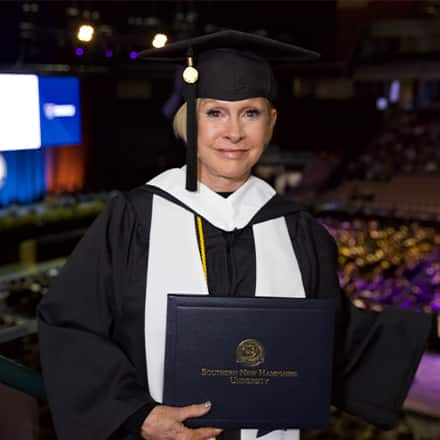What Can Financial Aid Be Used For? Your Financial Aid Offer Explained

A college degree is an investment — and it's one of the most important ones you can choose to make because it's an investment in yourself. But that doesn't always mean it's an easy decision.
That's because tuition has a reputation for being expensive, and the financial aid process is known for being confusing. Depending on your financial situation, you may receive a letter offering money to help you pay for college. Still, questions can arise:
- Is all the money I was offered a good thing?
- Was I offered any money I don't have to pay back?
- How many years will I be in debt after I finish college?
- How much money will I have to pay out of pocket?
Your finance counselor can answer all these questions — and more. But first, here's a guide to help you better understand what financial aid can be used for and what your financial aid offer might include.
What is Financial Aid Supposed to Be Used For? And How Do I Get It?
Financial aid is money that helps students pay for college. According to the U.S. Department of Education (ED) Office of Federal Student Aid, financial aid can be applied to your college tuition — but you may also be able to use it for other expenses, such as for housing and textbooks.
You can find out if you're eligible for financial aid by filling out the Free Application for Federal Student Aid, better known as the FAFSA.
In the days after you apply for financial aid, you'll be able to access a copy of your FAFSA Submission Summary. This shows all of the information you've entered for your review. Your report is also sent to any schools you added when filling out the FAFSA. Each school uses the report to determine the amount of aid you're eligible to receive.
![]() If your report mentions that you’ve been selected for verification, there may be no need to worry. Many people are chosen at random to confirm that the information on your FAFSA is correct. Once you submit the documentation your school is looking for — and by the deadline — you can move forward with the process.
If your report mentions that you’ve been selected for verification, there may be no need to worry. Many people are chosen at random to confirm that the information on your FAFSA is correct. Once you submit the documentation your school is looking for — and by the deadline — you can move forward with the process.
At that point, schools would send you your financial aid offer, which lists any funding you're eligible to receive. It's important to fill out the FAFSA every year you're in school to keep your financial aid up to date with your current financial status.
Let's learn more about the types of aid you could receive.

What Does My Financial Offer Mean?
Your financial offer may include several different types of aid. Before you decide what you'll accept or decline, it's important to understand each one so you know what will be expected of you each term — and beyond graduation.
Grants and loans are just two types of financial aid you might come across.
College Grants Usually Mean Free Money
If you're offered grants for school, take them.

"Grants are free money," said Alena Ramic, a team lead in Student Financial Services (SFS) at Southern New Hampshire University (SNHU). In most cases, they don't need to be repaid.
One grant that students may be eligible for is the Federal Pell Grant. Eligibility for the Federal Pell Grant is determined by the U.S. Department of Education and based on information provided on your FAFSA. Typically, only undergraduate students are eligible to receive the Federal Pell Grant, and eligibility can vary by year.
According to the Federal Student Aid Office, some factors may include:
- Student Aid Index (SAI): The amount is based on a formula that includes you and/or your family's income, assets and benefits, and it determines the amounts and types of federal aid you're able to receive.
- Cost of attendance: This includes tuition, fees, food and housing, books and more.
- Enrollment status: Whether you have a full-time courseload or are considered a part-time student.
- Length of enrollment: The number of terms you plan to attend within an academic year can also affect the amount of aid you're offered.
During the 2022-2023 school year, nearly one-third of students nationally received Pell grants, according to the National Center for Education Statistics (NCES).
The Federal Pell Grant may not be the only grant you're eligible to receive. By doing your own research, you can see what else is out there.

"There are many grants that allow students who reside in a specific state to apply for those," Ramic said. "There are also grants based off of abilities and hobbies that students can apply for, and even for those who have military affiliation ... it's just a matter of investing time and effort into researching and applying for grants."
Chelsea Brocenschi, a finance counselor within SNHU's Student Financial Services team, noted that accepting grants often means borrowing less.
"Although grants aren’t designed to cover the full cost of tuition, it can still be extremely helpful in the long run by helping students reduce their need to rely on loans as heavily as they would have without grants," she said.
Ramic agreed: "By choosing to accept grants, you place yourself in a better situation because grants ... reduce the cost of tuition."
Next Step: Federal Student Loans
The other type of financial aid comes in the form of loans. After you've gone through all the grants you've been awarded, you'll next want to take a look at the loans you've been offered.
Loans are money that you borrow and need to be repaid with interest. Because taking out a loan with interest means that you’ll pay back more than you borrowed, it’s crucial to completely understand the repayment options available to you.
There are two standard federal loans that you could be offered, according to the Federal Student Aid office:
- Federal Subsidized Loan: You may be eligible to receive this if you’ve demonstrated financial need based on the information provided in your FAFSA. The government pays your interest on the loan while you are in school, and the interest only begins accruing six months after you’ve graduated or are no longer enrolled in courses.
- Federal Unsubsidized Loan: Both undergraduate and graduate students are eligible for this type of loan. The unsubsidized loan differs from the subsidized one because you'll be responsible for the interest that begins accruing as soon as the loan is disbursed to your school. You'll need to decide if this is an option you can afford to pay back upon graduation.
Because the interest on subsidized loans starts to accrue after you leave a school, financial services teams like the one at SNHU would encourage you to accept this type of loan before considering an unsubsidized one.
![]() "It’s important that we ensure our learners understand what their financial aid (offer) consists of and what they’re actually borrowing for their education," Brocenschi said. "Although using loans is the reality for a large number of students, we want to help our students be as efficient as possible when managing their borrowing."
"It’s important that we ensure our learners understand what their financial aid (offer) consists of and what they’re actually borrowing for their education," Brocenschi said. "Although using loans is the reality for a large number of students, we want to help our students be as efficient as possible when managing their borrowing."
After accepting federal loans, some students may choose to discuss private loans to help fund their education — though they typically come with a higher interest rate.
"Normally, I try to stay away from talking about private loans because students usually don't want their credit hit and don't want to enter repayment right away," Ramic said. "Most private loans do not have a grace period or deferment. I only speak to it when a student asks, which is very rare."

How to Accept Your Federal Student Loans
Should you decide to accept loans, there are a few steps you'll have to take after receiving your financial aid offer.
 Start the Counseling Process
Start the Counseling Process
If you accept any loans, you'll be required to complete entrance loan counseling.
![]() "This is meant to assist students with gaining a better understanding of their financial aid (offer)," Ramic said. "It allows them to put things into perspective and even asks them questions to ensure they are aware they want to use loans to fund their education."
"This is meant to assist students with gaining a better understanding of their financial aid (offer)," Ramic said. "It allows them to put things into perspective and even asks them questions to ensure they are aware they want to use loans to fund their education."
Entrance loan counseling reviews the types of financial aid, interest rates, origination fees and the lifetime limit when borrowing federal student loans, according to Ramic. "It also includes a budgeting tool to allow students to put their financial information in to see if they can afford the average payment for loans when they enter repayment," she said.
Counseling through the U.S. ED website should take no longer than 30 minutes.
 Sign the Legal Documents
Sign the Legal Documents

Next, you'll be asked to sign a Master Promissory Note. "A Master Promissory Note is completed to acknowledge that you are taking out a loan and promise to pay it back when it comes due," said Donna Camire, a Global Campus director of Student Financial Services at SNHU.
Counselors can help in this area because they want to make sure you're not accepting any more than you need to, Brocenschi said.
"Some students (may) receive more than what is actually needed to pay for their tuition each term," she said. "Although the excess funds left from the loans may seem enticing, it’s important to remember that these 'refunds' are still loans that count toward your overall borrowing and must be repaid."
To help put that into perspective, Brocenschi said to consider that for every $10,000 you borrow in student loans, you would be paying $100 each month while on a standard 10-year repayment plan.
"Borrowing only what is needed is key to making sure you graduate with as little debt as possible," she said.
Deciding what needs to be borrowed is based on each student's circumstance, said Camire. There will be times when the individual needs all of the funds and other times, they won't.
 Have Your Counselor Explain Everything — Twice, If You Need It
Have Your Counselor Explain Everything — Twice, If You Need It
Don't get off the phone call with your counselor until you have a solid grasp on absolutely everything.
"One of the most common conversations I have with students is the offer breakdown," Brocenschi said. "This is essentially where we break down everything there is to know regarding their financial aid (offer), and it allows our students to ask us questions as well."
![]() At SNHU, finance counselors put in the time to help graduating students feel confident about their financial position.
At SNHU, finance counselors put in the time to help graduating students feel confident about their financial position.
"Conversations like this, on average, last anywhere from 15 minutes to two hours, depending on how many questions a student has," Ramic said. "Because this will affect them in the long run, I don't mind investing time to ensure the student has their questions answered and that we are setting them up for success — now and in the future to come."
Never feel rushed when speaking with a counselor. It's crucial to have every question that you have answered.
"I often have students preface their question with 'This is probably a stupid question,' but there’s really no such thing as a stupid question regarding financial aid," Broncenschi said. "If I can help students better understand their options for funding their education or help them figure out a plan of action that best suits their needs, I’m more than happy to help."
Your Best Interest at Heart
Finance counselors want what's best for you. Many of them have been in students' shoes during their own educational experience — wanting to better understand financial aid and what it could mean for their lives in the future.
"Although funding may not always be the first thing that some students think about when applying for college or the most exciting thing to think about, it’s one of the most important factors regarding an education," Brocenschi said. "We’re here to walk students through the financial aid process and try to make it as simple, understandable and stress-free as possible."
A degree can change your life. Choose your program from 200+ SNHU degrees that can take you where you want to go.
Deidre Ashe was 9 years old when she launched her professional writing career. While spending a day at work with her dad, she penned her first book, illustrated it and sent it off to a publishing company — after finding the address on the copyright page of one of her paperbacks. While the story never made it to the shelves of libraries, the editors wrote back, encouraging her to continue pursuing her writing passion. (Yes, she still has that letter.)
After earning a bachelor’s in journalism, Ashe spent a decade working in the media industry. She then transitioned into marketing, later getting her MA in Communication from Southern New Hampshire University in 2018. Connect with her on LinkedIn.
Explore more content like this article

What is a Master’s Degree?

How to Get Better Grades in College

SNHU Spotlight: Marilyn Barth, BA in General Studies Grad
About Southern New Hampshire University

SNHU is a nonprofit, accredited university with a mission to make high-quality education more accessible and affordable for everyone.
Founded in 1932, and online since 1995, we’ve helped countless students reach their goals with flexible, career-focused programs. Our 300-acre campus in Manchester, NH is home to over 3,000 students, and we serve over 135,000 students online. Visit our about SNHU page to learn more about our mission, accreditations, leadership team, national recognitions and awards.

